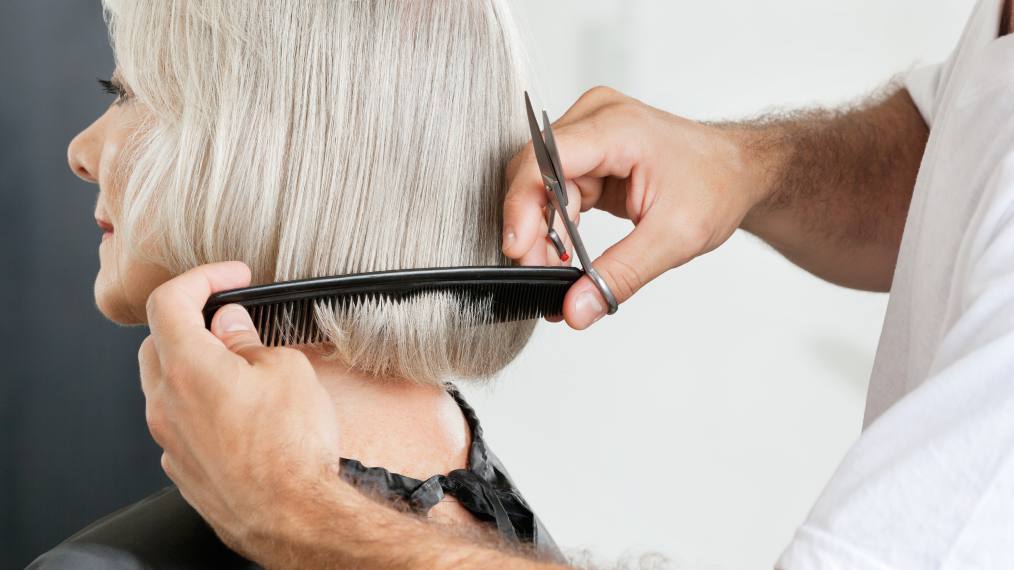What I learned as a hairdresser in a war zone

I don’t think my life is much different from anyone else’s, except that I decided to be a hairdresser in a war zone.
When I first arrived in Kabul, I felt like I had been transported to biblical times – only most of the people had guns and I only had my scissors. It wasn't until I spent time in Afghanistan that I learned how powerful my trade of hairdressing was. The minute I pulled out my scissors and cape, I felt like the most popular kid in class – everyone wanted a haircut or colour.
People like to think that because women are covered, they are plain – no makeup and hair undone. Let me tell you – that is the opposite of the truth. I have always gone that extra mile with my own hair and makeup, but these women made me look like a Plain Jane.
One lady told me how she drove 12 hours over the Khyber Pass to Pakistan – dodging the Taliban the entire way – just to get foils and a good haircut. The Taliban had forced the salons to close and a few had gone underground. I was stunned at the risk these women took just so they could have their hair done for a wedding party – a custom that had always been a strong part of the culture but was now against the law.
It was when I walked into that first salon that I knew there was no turning back. I was going to do something for my sister hairdressers. I realised that hairdressing was a fantastic portable skill, one that was perfect for Afghanistan, and one that could give women choices and a way to feed their family.
This was a skill that could be done in or out of the home, and it would be a sanctuary for women only. No man could control – or even step foot into – the salon. It would be such an empowering place for the women to be free.
Opening the Kabul Beauty School was one of the most rewarding but difficult things I have done in my life. In the beginning, when I was working with so many young Afghan women at the school, I felt so overwhelmed by the traumas that each of these girls had endured for so many years. But on the other hand, I saw the strength and power that each of these young women seemed to have been born with.
I was horrified when I heard about arranged marriages at the age of twelve, how so many had to flee their homes for years due to the Taliban, and about those who had to stop going to school in fourth grade because of war. I was amazed at the core strength of these women.
I never had the intention of being a writer, but I always wrote. I kept daily notes and journals so that my head could purge some of the information it was gathering each day. Often, I felt that I was on overload, I was out of my comfort zone, I was out of my element, and each day, I was listening to a new and difficult story that one of the girls needed to share.
The more I wrote, the more I began to understand that these women didn't need my pity, that we really are all the same. Like them, I am a woman, I am a mother, and I am a daughter. When I realised that, it all came together and the fun began. When I stopped looking at them as poor, tragic Afghan women, and instead as women who had gone through lots of stuff and who now wanted to move forward – just like most of us – everything changed.
I decided I wanted the world to see these beautiful women as I did. I wanted them to be more than a news clip or a sound bite. I wanted the world to see them through my eyes.
Afghanistan is a complicated place, and so when I left, I felt shattered. I had really thought that I would spend the rest of my life in Kabul; I never saw myself moving back to the United States. I missed the girls and my old life so badly, and spent the next few years grieving the loss of my Afghan family.
Because I didn't want to let go of Afghanistan, the only way I could keep it close was to keep writing about it. I told my agent that I really wanted to write another book, but this time I wanted to write fiction. I wanted to write happy endings. I figured if you put it in writing, just maybe it will happen in real life. Also, I had to prove to my kids that I wasn't a one-hit wonder.
I have learned so much about myself while writing my five books. I’ve learned that I am a storyteller first and a writer second. I love the process of developing a book. I love how the characters come alive and become your best friends, and how some turn into people you never want to see again.
Writing is my best therapy, it is my best friend, it is a true companion.
Deborah Rodriguez’s new book, The Zanzibar Wife is available now (Penguin Random House, RRP $32.99).
Written by Deborah Rodriguez. Republished with permission of Wyza.com.au.
